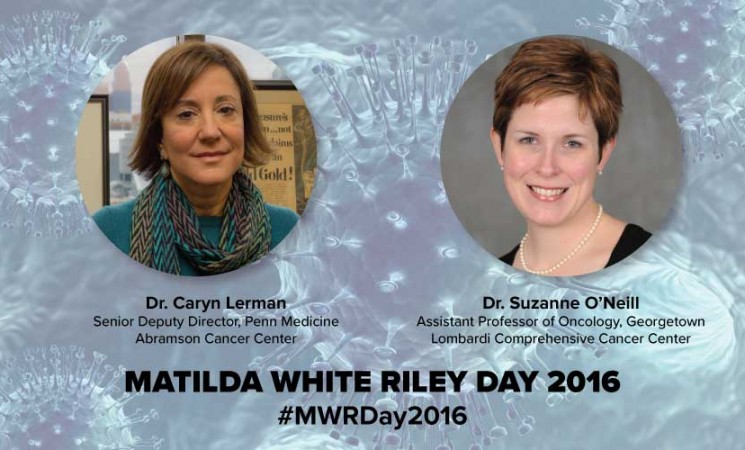Archived Content
This page is archived and provided for historical reference. The content is no longer being updated, and some of the information may have changed over time and could be outdated or inaccurate.

By Isabel M. Estrada-Portales, Ph.D., M.S.
Discoveries in neuroscience and prevention for improved health outcomes
“All of this work, my work, flows directly from Caryn’s work,” says Dr. Suzanne O’Neill, Assistant Professor of Oncology at Georgetown University and behavioral scientist at the Fisher Center for Hereditary Cancer and Clinical Genomics Research.
Caryn? She was referring to Dr. Caryn Lerman, the John H. Glick Professor in the Department of Psychiatry at the University of Pennsylvania, and National Institutes of Health (NIH) Office of Behavioral and Social Sciences Research (OBSSR) 2016 distinguished scholar, who will deliver the Lecture for Excellence in Behavioral and Social Sciences at the Matilda White Riley Behavioral and Social Sciences Day on June 20 in Washington, D.C.
As luck would have it, Dr. O’Neill will be a panelist at the same event to discuss her research and career. To say that Dr. O’Neill is happy about this coincidence is putting it mildly.
“She [Lerman] was at Georgetown when I was here doing my dissertation,” O’Neill said. “So this work flows directly from her. Probably some of the women I recruited who were in the registry came from early studies of hers. When I was doing my dissertation, this work was moving into the literature and Caryn’s work was at the forefront.”
There is, however, a previous well from which O’Neill’s and Lerman’s work flow from decades ago and into the future: The groundbreaking vision of Dr. Matilda White Riley (1911-2004), who championed the integration of a governing biopsychosocial knowledge in the biomedical sciences.
While Lerman and O’Neill have distinct areas of expertise, their respective bodies of innovative research work at the axis of behavior, prevention, and outcomes.
Lerman, a recipient of the National Cancer Institute (NCI) Outstanding Investigator Award in 2015, says her work leans more on the biopsycho side. Currently, her lab is working to identify the brain substrates for self-control; especially those connected to smoking and, lately, also eating behavior.
“The most exciting developments are the identification of a neuro biomarker, a brain signature that predicts relapse to smoking, in nicotine- dependent smokers, above and beyond the clinical measures used to determine who may be at increased risk,” explains Lerman. “They can predict who will relapse with about 80 percent accuracy, which provides even better predictions than existing measures.”
She acknowledges the influence of White Riley. “Clearly the social networks in which people exist and the environmental cues people are exposed to in their social environments are also important social influences on behavior,” Lerman says.
Her work focused on genetic differences that influence a person’s ability to quit smoking had a transformative impact on Lerman’s path forward. Through that work, in part, she realized that it was important to study brain function to sufficiently understand the processes through which brain factors can influence complex behaviors.
“I saw,” Lerman says, “that getting into … that black box of brain activity would be important.”
@PennCancer Prof Lerman: Important behavior influences-brain function, social network, environment cues #MWRDay2016
O’Neill, a clinical psychologist and an OBSSR and NCI grantee for the last 15 years, has studied hereditary cancer, and behavioral and psychosocial outcomes related to genetic testing. Her most recent study focuses on women ages 18–25 from hereditary-cancer families, or families where there is a known mutation in BRCA 1 or BRCA 2. Approximately 100 women are being interviewed for the study.
“This whole line of research would not exist without the work of Dr. White Riley, and the work of others,” O’Neill says. “To have social sciences aligned with what is primarily medical research, and to understand that people receive health information and have to adapt to it, and that patients and providers don’t necessarily act on the health information they have available in a way that’s going to maximize their health or maximize the utility of the information that is available — so it’s all incredibly important.”
We owe to Dr. White Riley the alignment of #socialsciences with what’s primarily medical research #MWRDay2016
O’Neill, whose current study is nearing the end of the interview phase, cannot reflect on White Riley’s contributions without recalling Lerman’s influence and impact on her area of study.
A cornerstone of O’Neill’s study examines how the experiences young women went through with regard to family members who were diagnosed with cancer, or their familial burden of cancer, affects how they view cancer or genetic risk for cancer in their own lives. Like Lerman, O’Neill had an “ah hah” moment with regard to her field of expertise.
@LombardiCancer @Georgetown Prof O’Neill: Finding good mentorship is important for female scientists #MWRDay2016
She says she always had in interest in psychology. When she was in high school and other students were preparing science projects on biology or psychics, she was doing studies on learning and memory. Her deep interests in people, genetics, cancer, and resilience have shaped her path. O’Neill noted that finding good mentorship is important for female scientists.
Lerman and O’Neill are each chartering courses for other female scientists to follow, and empowering them to revolutionize discovery—for real life, labs and research—for the generation behind them.
On June 20, O’Neill and Lerman be, once again, sharing their research with each other and others, and helping shape the future of the behavioral and social sciences field, by providing the mentoring and career advice from which they once benefited. The event will take place at the United States Institute of Peace in Washington, DC. It is free and open to the public, but registration is required.








